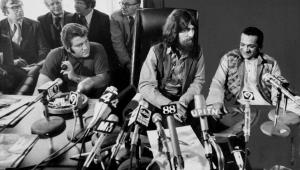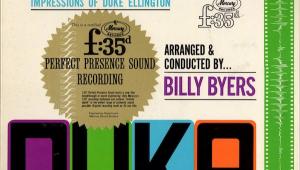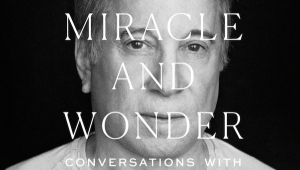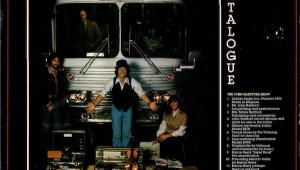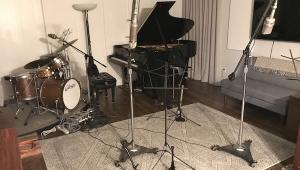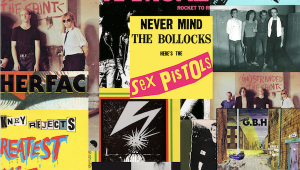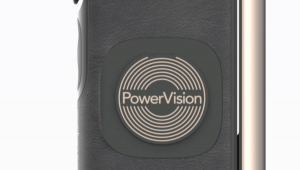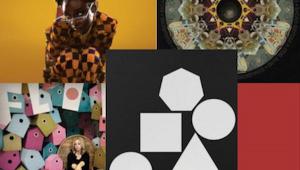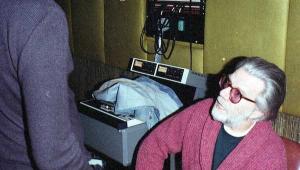The Musicangle Interview: Producer Rick Rubin Part I
Producer Rick Rubin born in Long Beach, Long Island, New York in 1963, graduated high school in 1981. Johnny Cash, born in Kingsland, Arkansas in 1932, graduated high school in 1950. Yet these two, separated in time by more than thirty years, and by an even wider socio-cultural gap, will forever be linked by the music they created together during Cash’s last decade of life. Rubin’s resurrection of Cash’s career with the release of American Music in 1994 is but one fascinating facet of this enigmatic figure’s twenty year career in music.
In 1984, while a film and video student at N.Y.U., Rubin met Russell Simmons at Danceteria—a New York club where downtown hardcore rockers and uptown rappers mixed comfortably—and the two immediately hit it off, sharing a common musical vision of hard beats and hard rhymes, with Simmons drawing from R&B roots and Rubin from hard rock. Rubin had a vision of melding the two seemingly disparate musical forms and though he’d never produced a record, he sought out the duo of T. La Rock and Jazzy Jay, and out of that came a 12” vinyl single, “It’s Yours,” which was released on Partytime/Streetwise records. It featured rhyming raps set to a loud, hardcore beat with metal overtones. Though the track went on to sell around 100,000 copies—an impressive number for the newly emerging musical genre—Rubin was never paid for his work.
Meeting again with Simmons—this time in a music promoter’s office—and sharing non-payment woes, the two decided to go into business together. They co-founded Def Jam Records, running it out of Rubin’s dorm room. Each contributed $4000 to the company. Def Jam’s first release, L.L. Cool J’s “I Need a Beat,” reportedly made for around $700, sold over 100,000 copies. A month later, the label issued The Beastie Boys’s “Rock Hard/The Party’s Getting Rough/ Beastie Groove.” Less than a year after its founding, Def Jam had issued seven singles and had negotiated a distribution deal with Columbia Records. Rubin also found time to produce an album for thrash/metal band Slayer. He was 22 years old.
Over the next few years, Def Jam, with Rubin producing, issued The Beastie Boys’ pivotal Licensed to Ill, Public Enemy’s Yo, Bum Rush the Show! and many other successful singles and LPs—including The Cult’s Electric. Rubin was not about to be pigeonholed musically. Simmons and Rubin eventually split up, with Rubin creating the Def American label. In the decade that followed the founding of Def Jam, Rubin went on to produce and executive produce an eclectic mix of artists including Red Hot Chili Peppers, Andrew Dice Clay (!) and Mick Jagger. 1994 saw the release of Tom Petty’s Wildflowers and of course Johnny Cash’s American Music. More recently, he’s produced System of a Down, Rage Against the Machine, Audio Slave and many other groups.
A few months ago, through Grant Samuelson of Shunyata Research, I became aware that Rubin was also a devoted audio enthusiast. I expressed an interest in meeting and interviewing Rubin and through Samuelson, I was able to connect up with Rubin who agreed to the interview. Early in December of this year (2003) I traveled to Los Angeles, and met with Rubin in his home in the Hollywood Hills, which also serves as a recording studio, and out of which he runs his business.
Once inside the gates of Rubin’s impressive enclave—an imposing, classic Hollywood estate—I made my way to the back door where I was greeted by an assistant and ushered into a listening room. Both outside and in, the property is populated by Eastern religious shrines and statues, about which I admit complete ignorance.
I sat down on the couch, not noticing the stuffed Polar Bear standing directly behind me, until much later when I returned from the bathroom. While I waited for Rubin’s arrival, I noted the equipment: Audio Physic Virgo IIIs (behind which were a pair of enormous Legacy Audio towers), Manley monoblock tube amps, a Hovland HP-100 preamp, and Sony SCD-1 SACD player. Cables included Acoustic Zen interconnects and speaker cables and Shunyata Research AC cords. Yes, Rubin was clearly a serious audiophile.
A short time after I arrived, a relaxed, affable Rubin appeared. Though the interview was scheduled to last for around an hour, we ended up spending most of an enjoyable afternoon together. After finishing the formal Q and A, we talked about audio gear, dogs, music, philosophy, more audio, and I can’t remember what else. I got a tour of the recording facility, which included a trophy room filled with various keyboard instruments and stuffed, mounted animal heads obviously left there by a previous owner. Rubin is a vegetarian.
MF: The first thing I have to ask you is a favor for my friend Vinnie Favale. He works for The David Letterman show. He said he met you at Howard Stern’s apartment.
RR: Oh, Vinnie. I think I met him.
MF: We became friends because I was a phone in guest on the Stern show once and I said that records sound better than CDs and he called in screaming that I was an idiot, and I invited him over and I played Beatles for him on original British pressings and that did it. Totally blew his mind. So we became friends—not because of that! He wanted to know what you thought of The Beatles’s Let It Be Naked. Have you heard that?
RR: Yes. I have mixed feelings about it. I like hearing anything Beatles different is exciting, thrilling and that’s great. Some things were great like “Two of Us” sounded remarkable but I really miss all of the Phil Spector stuff. I think something like “The Long and Winding Road” is a tragedy. It’s interesting, but the song isn’t as good of a song because of the production—the lack of production. It sounds like a lounge song. What was great about it is gone. It’s odd. Normally so much of my job is to hear through production and look at a song. Maybe it’s just because I heard it when I was so young first that it kind of made its first impression, but I always thought it was a better song than it actually is, and I think in large part that is due to the production.
MF: And it seems to me that they modernized it. They squashed it and they compressed it and they mixed it hard…
RR: It doesn’t have what it had. But I will say “Two of Us” was thrilling to me, of everything on it. The other thing that really bummed me out were John Lennon’s vocals. If you’re into Lennon at all and if you know how he felt about things, he really didn’t like his own voice. He was embarrassed by it, and if you listen to his voice on all of the Beatles records, there are all kinds of double tracks or different effects—complicated effects—that kind of make the John Lennon sound. And it’s true that here he’s stripped naked and I don’t think he ever would have wanted it stripped naked. It’s like you don’t really want to hear Elvis without the “slap” (echo). It’s part of the Elvis sound. You really wouldn’t want to hear Robert Plant without the delay he uses. There are just certain artists that use effects and have kind of created a sound for themselves.
MF: Wouldn’t it be like taking Hendrix’s guitar and running a straight mike feed and not putting it through…
RR: Very much so. I could understand why Paul would want to do it because Paul likes the sound of his own voice but I don’t think it was considerate of John and I think John would have hated it.
MF: Maybe what I owe you are some CDs made from the original British vinyl. Even on the CD you can hear it
RR: Great. Have you heard DSD? That really sounds great.
MF: Yes.
RR: That really sounds good.
MF: I just got the multi-channel SACD remix of Tommy and it’s the best multi-channel remix. It remains true to the original because they don’t stick all kinds of crap in the back, but the two track original on DSD allows people to hear for the first time close to what an original British Track pressing sounds like—the drums especially.
RR: Right.
MF: Are you concerned that recorded music is falling out of favor?
RR: Hmm.
MF: Because I know that New York Times music critic Jon Pareles doesn’t really like recorded music. It’s more of a nuisance to him. Music is to be heard live and recorded music is basically a promo item.
RR: I think I feel in many ways the opposite. I feel like—I don’t want to say “perfection”—but there’s an ideal that’s reached in recorded music that I very rarely see live. It happens on occasion, but I think if there’s an artist that you see live who’s great and the record isn’t so good it’s really more to the, I would blame the people in the record making process for not doing their job. But the possibilities are for recorded music to be, not sonically, because there’s nothing like sitting in the room with a piano and hearing the piano and the overtones and the nature of that instrument..it’s never going to be the same coming out of the speaker as it is just from a sonic perspective, the nature of the beast. But from a performance perspective and the things that you can do in the record making process and the clarity of what you can hear, it’s very hard to get that same experience (Iive). I don’t go out to see a lot of music live because I’m always so disappointed. I’d rather stay home and listen to my CDs.
MF: Especially when they mix it badly live. Some of these mixers don’t understand the difference between sound reinforcement and sound creation.
RR: That’s true. It depends on where you’re seeing it, but most of the venues are terrible.
MF: I went to Skirball Center last night (a performing arts center in L.A.) to see Wayne Horvitz. They did a really good job with the mix. So where do you see the music business in five years?
RR: I don’t know about five years but there is going to be a revolution. I think it’s ultimately going to be very good for the business. I don’t exactly know what the model is going to be but I think people love music more than they ever have and they’re willing to pay for it. There just needs to be a system set up that “incentivizes” people to listen to music instead of ‘de-incentivizing” them which it is now. And I imagine if it ends up being a model like cable TV where you pay a monthly subscription rate and you can have all you want, the industry would probably double. From the business side it’s probably going to be complicated. No one knows how that’s going to work but from the consumer side someday you’ll be able to—hopefully in not that long— you’ll be able to hear anything you want to hear on demand immediately for a very reasonable price. You’ll get more music and pay less and have everything available to you and that’s fantastic! And it will incentivize people to hear new things that you might not want to risk the price of a CD to hear. I think one of the big problems, and I do blame record companies for this really—A&R staffs—and it probably all goes back to the corporatization of the record business becoming big business—is so much, if you’re a kid and you hear ten songs on the radio by ten bands you like and go out and buy the ten CDs today, there’s a very good chance you’re not going to like any of those albums. You’ll like the songs you liked and you’ll feel you were ripped off otherwise. And I think that de-incentivizes people to continue buying CDs.
MF: Wasn’t getting rid of the single a big problem because even when there were CD singles, they were still six or seven dollars and it was a song and a re-mix and an edited version. I always thought that kids needed a buck record, and so they invented their own. That’s what great about downloadable music. They invented their own dollar single.
RR: That’s true. It will be interesting to see how that goes, how it plays out. It’s definitely great at 2 O’clock in the morning if you decide you want to hear something, to be able to. It’s amazing!
MF: How to we get young people to appreciate listening to music. Because I don’t think young people listen to music the same way as they used to. When I was a kid, or when you were a kid (and I was a kid a lot longer ago), you’d buy a record and you’d go home and you’d sit and listen to it and you wouldn’t be distracted. I just think that most of the kids that I talk to are doing other things, they don’t really concentrate on it.
RR: I think it depends on who the artist is. For example when a new Radiohead album comes out people take it home and listen to it seriously like they would have a Beatles album. I think so much of the music being made today is disposable. It’s as much the fault of the music as it is the culture. I also think that people aren’t expose to hearing great music on great systems is thrilling. It’s just not so available to people.
MF: And yet a lot of people with disposable income who can afford a good system don’t do it. They don’t know about it. That’s why I want to enlist people like you and others who are respected both musically and otherwise to…you know the “got milk?” campaign? I want a “got hi-fi” campaign. Would you participate in something like that?
RR: Of course.
MF: It’s necessary.
RR: I agree.
MF: People come by and hear my system and they’re amazed. They say “I didn’t know this existed.”
RR: Same here all the time. Musicians come over and listen to their CDs and say “I never knew it could sound like this,” and then “hook me up, what do I have to do to get this?”
MF: And why don’t they know about this? Because the industry has been marginalized. Like if you’re an audiophile, it’s like you’re a pedophile. You hear “oh, audiophiles they don’t care about music, they’re just into showing off.”
RR: Well there’s a whole side of the audiophile world that cares more about the way it’s recorded than what’s being recorded.
MF: Well of course. I get all of those recordings.
RR: Form over content. The content has to be great and unfortunately a lot of the people making great content don’t care so much about how it sounds, or don’t know what it could sound like.
MF: But there are still a lot of great recordings being made.
RR: True.
MF: I mean the Johnny Cash recordings you were involved with sound fantastic and I’m sure the vinyl was cut from digital sources.
RR: It was. Everything is digital on those. The first couple were recorded on ADAT and the later ones were recorded directly on to Pro-Tools.
MF: But the ADAT recordings were 48K/24 bit?
RR: Well what were the original ADATS because it goes back 10 years now.
MF: I don’t know. I have heard some excellent 48K/24 bit ADAT recordings.
RR: The guy who does my mastering at Sony in New York…
MF: Vlado Meller?
RR: Yea.
MF: Now somebody smashed The Mars Volta record (De-loused in the Comatorium.
RR: Him.
MF: WHY??????
RR: (chuckling) That’s what he does.
MF: He shouldn’t have done that! That sounds like it could have been a great recording. It was a great recording but he squeezed the dynamics out of it. A friend of mine’s a mastering engineer in New Jersey, his name is Alan Douches, you may have heard of him, he does a lot of alternative rock stuff and guys come in there and they say “I want it as loud as blah blah blah.” And he says “But then there’ll be no dynamics and music has to…” “I don’t care! I want it 1 dB louder!” And he tells them there’s nothing there already! Why is this? It doesn’t sound better on the radio. No one’s going to convince me of that. The radio is compressed to shit already anyway.
RR: That’s correct. Sometimes actually, if it’s too loud, it sounds worse on the radio.
MF: Something has to be done about that. Can’t you control the mastering guy? “Vlado, lay off!”
RR: The difference is though, I wish I had examples here to play for you. If I knew we were going to talk about this I’d go through the library and find examples. Ultimately, if you listen on a car sound system or in thye mainstream place where most people listen to music—cars, boomboxes sound systems you get at (chain stores), and if you “A/B” the less compressed version to the more compressed version, you pick the compressed version.
MF: Even in a good car stereo?
RR: Even in a good car stereo. We do shoot-outs all the time. I master with as many as five different mastering engineers mastering the same album and then we “A/B” them and it’s interesting, Vlado wins nine out of ten times, and he claims it’s not him. He’s got technology in that room that’s a 2 million dollar mastering suite that other people don’t have.
MF: “So I’m going to use it godamn it, even if it’s not better!”
RR: All I’ll tell you is that my whole job in life is to A/B things, that’s all I do, and for some reason, I don’t know that what he’s doing is necessarily the best, but I haven’t heard anything to beat it and we try.
MF: Too bad the vinyl can’t be cut from the uncompressed because people listening to vinyl today are not going to be wanting to hear the compressed version. The Mars Volta vinyl, I was hoping wouldn’t be compressed, but of course I have this laser turntable I just finished reviewing that won’t play that colored vinyl edition.
RR: How is that? It won’t play colored or sparkly vinyl. I just reviewed it. It has its good qualities and its bad. It plays dirt as loud as the grooves so that’s a problem, but yea, the compression thing just drives me crazy.
MF: Are there too many distractions now that music has gotten pushed somewhat aside? Video games, DVDs?
RR: I don’t know that it’s gotten pushed out aside but there are definitely more entertainment choices, no question, but I know that people are still moved by it. I see it all the time.
MF: I do to. I have a godson who’s twenty years old. He’s got a turntable and he’s buying all vinyl when he can get it. He loves vinyl and doesn’t go for CDs and he’s at the Berklee School of Music and kids come over to his place and say “what is that?” and then they listen and they hear how much better it sounds…
RR: And they’re right! It’s just that so much of my life gets put into making CDs sound as good as they can that it would be heartbreaking for me to get involved in vinyl because we can’t sound that good on CD.
MF: And yet you do a lot of vinyl. Double records.
RR: We do. But it’s never the first thing because the reality is like on the Red Hot Chili Peppers, we’ll sell ten or twelve million CDs and maybe ten thousand LPs.
MF: Ten thousand. That’s good!
RR: But still, it’s less than a percent of your audience and again, we want it to be as great as it could be, but we have to satisfy the people who are buying it in mass. So, so much of the job is trying to get the CD to sound good that if I listen to vinyl, I’d be sick every day at work!
MF: I know that feeling!
RR: It would ruin my life!
MF: Though CDs have gotten much better. They’ve learned how to make the converters so much better. I mean I want to an AES convention back in 1982 and Sony showed the first CD player which was the size of a refrigerator and they had Roxy Music’s Avalon on a CD and I had the Japanese vinyl pressing of that and a tricked out turntable and I knew what that record sounded like and it sounded horrible and people were going “wow!” And I was saying “No! What are you talking about? That’s horrible!” I went through ten years of hell after that. Now, are you planning on getting involved in SACD?
RR: I wanted to and tried but it was cost-prohibitive. It was so expensive to manufacture them, that we’d have to sell them for so much, that it didn’t make sense. We tried.
MF: Now would you license some of the titles to some of the independent labels?
RR: Probably would. I mean I love the SACD.
MF: I mean the Rolling Stones SACDs are excellent. Even the vinyl cut from the DSD masters sounds excellent.
RR: DSD is incredible. I just finished an album. Do you know who Krishna Das is? It’s like Hindu chanting. We recorded his last CD here on DSD multi-track and it is great. Unbelievable.







